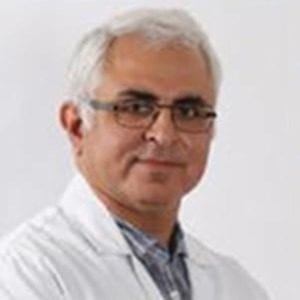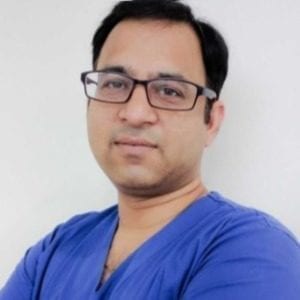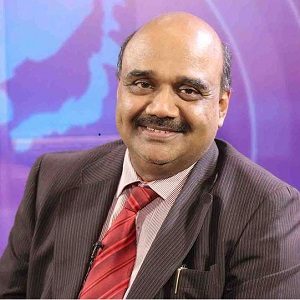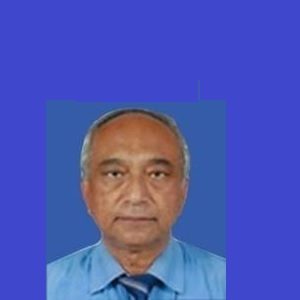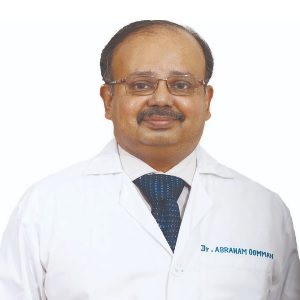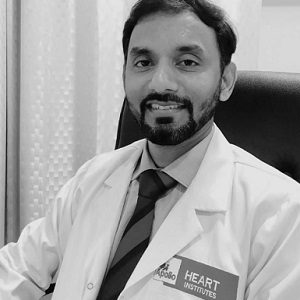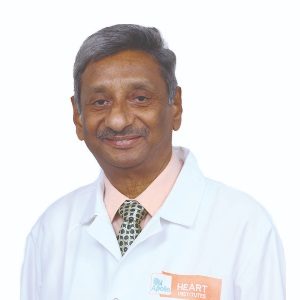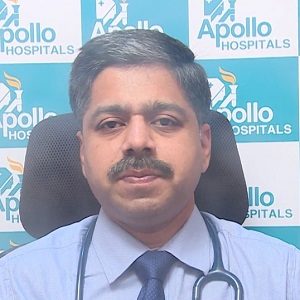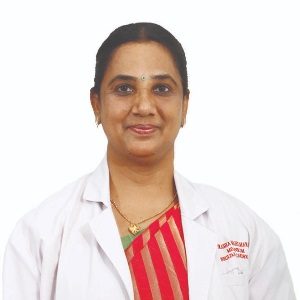Best ICD/AICD Implantation Doctors in India
- Cardiologist, Gurugram, India
- Over 20 years’ experience
Profile Highlights:
- Dr. Hemant Madan is an experienced and accomplished cardiologist, with a professional experience of around 20 years.
- His expertise includes all aspects of cardiology, including pediatric cardiology, complex coronary interventions, device implantation, all kinds of rhythm disorders, percutaneous treatment of valve stenosis, and peripheral interventions.
- Dr. Madan pursued his Fellowship at the Royal College of Physicians from Edinburgh in UK.
- Cardiac Surgeon, Gurugram, India
- Over 15 years’ experience
Profile Highlights:
- Dr. Rachit Saxena is an experienced cardiac surgeon, who is known for his extreme dedication to his profession, and for providing absolute patient satisfaction.
- Supported by an efficient cardiac surgical team, Dr. Saxena is known for successfully managing the most complex of cardiac surgical problems.
- Dr. Rachit Saxena is known especially known for the capability to perform cardiac surgery with minimal blood requirement and ensure early mobilization and return to work.
- Cardiothoracic Surgeon, Chennai, India
- Over 25 years’ experience
Profile Highlights:
- Dr. T Sundar is one of the best cardiothoracic surgeons in India.
- He is having extensive exposure to critical heart diseases and he has operated on them successfully.
- Dr. T Sundar is a Senior Consultant at Apollo Hospitals since 2003.
- He has been associated with international standards of surgery and diagnosis since his education period.
- Cardiothoracic and Vascular Surgeon, New Delhi, India
- Over 36 years’ experience
Profile Highlights:
- Dr. N Sastri is a renowned cardiothoracic surgeon in India with extensive experience in critical heart surgeries.
- He has nearly 36 years of experience and is a senior consultant- Cardiothoracic & Vascular Surgery with Indraprastha Apollo Hospitals, New Delhi.
- Dr. Sastri specializes in the diagnosis and treatment of vascular disorders using advanced techniques. He has expertise in Total Anomalous Pulmonary Venous Connection Repair, Arterial and Ventricle Defects Surgery, Cardiac Resynchronization Therapy, Balloon Valvuloplasty, CABG LV restoration, PDA Device Closure, PPI, Valve Replacement, and Atrial Fibrillation Surgery.
- Over the years’ Dr. Sastri had treated patients across various countries. In addition to the adult and neonatal cardiac surgeries, he is involved in research and put out many research papers in different medical journals.
- Interventional Cardiologist, New Delhi, India
- Over 47 years experience
Profile Highlights:
- Dr. Prashanta Kumar Ghosh is a senior cardiologist at Indraprastha Apollo Hospital in New Delhi with experience of nearly 47 years in the field.
- Dr. Ghosh has expertise in testing and monitoring cardiac problems. The procedures mainly include minimally invasive cardiac surgery, implantations, device closure for congenital heart diseases, cardiac catheterization, Carotid Angioplasty, Stenting, etc. Half of his experience came from practicing non-invasive cardiology.
- He has so far performed nearly 3 lakh Echos as well as thousands of Doppler and Trans Esophageal Echos in his professional journey.
- Dr. Ghosh has participated in many studies and published papers in various conferences and journals. He also delivers lectures to the students of many institutions across India and abroad.
- Cardiologist, Chennai, India
- Over 31 years’ experience
Profile Highlights:
- Dr. Abraham Oomman is one of the best Cardiologists in Chennai, having an experience of 31 years in this field.
- Dr. Oomman offers consultation and also performs cardiac procedures. He specializes in Preventive Cardiology, Interventional Cardiology, Rheumatic Heart Disease, and Lipidology.
- Patients also visit him for ASD and VSD Surgery, Dextro-Transposition of the Great Arteries (DTGA), Minimally Invasive Cardiac Surgery, and Vascular Surgery.
- Cardiologist, Chennai, India
- Over 22 years’ experience
Profile Highlights:
- Dr. Refai is a world-renowned cardiologist who practices at Apollo Hospital in Greams Road, Chennai.
- Dr. Refai completed advanced training in the United Kingdom after finishing his medical degrees in India.
- He specializes in Angioplasty (Stent implantation), Implantable Cardioverter-Defibrillators (ICDS), Transradial Rotablation, Chronic Total Occlusion Angiography, Pacemaker, Cardiac Invasive Procedures, Bypass Surgery, and other cardiovascular procedures.
- He was involved in many TAVI-related studies at King’s College Hospital in London, and a heart failure pilot trial at The Essex.
- Interventional Cardiologist, Chennai, India
- Over 38 years’ experience
Profile Highlights:
- Dr. I Sathyamurthy is a veteran Cardiologist and has an experience of more than 38 years in Interventional Cardiology.
- Dr. Immaneni Sathyamurthy is a distinguished personality who bagged Padma Shri, the fourth-highest Indian civilian award. In addition to it, he was conferred many awards for his contribution to the medical sciences.
- He has over 250 publications to his credit, some of these are used as textbooks in medical courses.
- Interventional Cardiologist, Chennai, India
- Over 25 years’ experience
Profile Highlights:
- Dr. Karthigesan A M is a renowned Interventional Cardiologist with more than two decades of experience.
- He completed advanced training in cardiac arrhythmia in the USA to serve his patients in a better way.
- Dr. A M Karthigesan received several awards from prestigious associations for his contribution to the field.
- Dr. Karthigesan authored several research papers and articles in premier periodicals and presented papers at national conferences.
- Interventional Cardiologist, Chennai, India
- Over 32 years’ experience
Profile Highlights:
- Dr. Asha Mahilmaran is a seasoned Interventional Cardiologist in Chennai, with more than three decades of expertise in the sector.
- She excelled in academics and was awarded a gold medal in medicine and cardiology.
- Dr. Mahilmaran offers Ventricular Septal Defect Surgery, Cardioversion, Carotid Artery Disease, Chest Pain Treatment, Cardiac Ablation, and Dextro-Transposition of the Great Arteries (DTGA), etc.
- Over the years, she has performed over 15,000 preventive heart checkups.
Best ICD / AICD Implantation Hospitals in India
AICD Implantation
Automated Implantable Cardioverter-Defibrillator (AICD) or an implantable cardioverter-defibrillator (ICD) is a device that is placed in the chest & monitors the heart rate & rhythm. In case, a fast abnormal heart rhythm is detected, the device provides energy to the heart muscle which normalize the heart rhythm.
The ICD comprises of two parts:
First part is the Lead(s) which are made up of wires and sensors that monitors the heart rhythm and delivers energy used for pacing.
The second part is the Pulse Generator which has a battery that houses energy, & a tiny computer that receives information from the leads to determine how the heart is beating.
Types of ICDs
Single-chamber ICD
A lead is attached in the right ventricle that provides energy to the ventricle to restore a normal heart rhythm.
Dual-chamber ICD.
Leads are attached in the right atrium and the right ventricle which provides energy to the right atrium and then to the right ventricle that helps the heart to pace in a normal sequence.
Biventricular ICD
Leads are attached in the right atrium, the right ventricle and the coronary sinus that lies adjacent to the left ventricle and helps the heart beat in a more efficient way. It is specifically used for patients suffering with heart failure.
Functions of ICD
- When the heart beat is too fast, a chain of small electrical impulses are delivered to the heart muscle which restores heart rate and rhythm. This is known as Antitachycardia Pacing (ATP)
- A low-energy shock is delivered which restores heart rhythm. This is known as Cardioversion.
- When the heart is beating too fast, a high-energy shock is delivered to the heart muscle which restores heart rhythm. This is known as Defibrillation.
- When the heart beat is too slow, a small electrical impulses is delivered to the heart which stimulates the heart muscle to maintain a suitable heart rate. This is known as Bradycardia pacing.
Conditions in which ICD is implanted
- Episode of sudden cardiac arrest (ventricular fibrillation).
- People who are at high risk for sudden cardiac arrest.
- Hypertrophic cardiomyopathy.
- Dilated cardiomyopathy.
- Ventricular tachycardia.
ICD Implant Procedure
The ICD may be implanted in two ways:
1. Endocardial (transvenous) Approach
The first way is the endocardial (transvenous) approach. It the most approach in which ICD is implanted. In this approach, a small incision is made under the collar bone. The lead is inserted into the heart, through a vein. The generator is placed in the upper chest, under the skin & attached to the lead(s).
2. Epicardial Approach
The second way is epicardial approach. This requires open-heart surgery. The lead is sewn onto the heart instead of placing the lead through a vein.
The morning after the implant, the patient will undergo a chest X-ray to make sure the ICD leads are in the proper position and the ICD will be programmed to ensure it is functioning properly.
Precautions after ICD Implantation
Short-term precautions
- Avoid vigorous exercises, including golf, tennis, swimming, bicycling, bowling or vacuuming
- Don’t lift anything weighing more than 5 pounds
- Avoid strenuous exercise programs
Long-term precautions
- It is safe to talk on a cellphone, but avoid placing the cellphone within 6 inches of the ICD implantation site when the phone is turned on.
- After surgery, the patient will receive a card that stating he/she have an ICD. Show this card to airport personnel because the ICD may set off airport security alarms.
- Avoid scanning with a hand-held detector to less than 30 seconds over the site of the ICD or make a request for a manual search.
- Some procedures, such as magnetic resonance imaging (MRI), magnetic resonance angiography (MRA), and radiofrequency or microwave ablation are not recommended after ICD implant.
- Stand at least 2 feet (0.6 meters) from welding equipment, high-voltage transformers or motor-generator systems.
- Keep magnets at least 6 inches (15 centimeters) from the ICD site.

